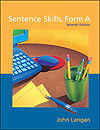 |  Sentence Skills, Form A, 7/e John Langan,
Atlantic Cape Community College
Practice in Effective Writing
Key Terms
| adequate details | details that provide enough support for a topic sentence: to support a claim about a friend's habitual tardiness, for example, more than one example should be provided in order to provide adequate support
|  |  |  | | general subject | a broad topic, such as "marriage"; in prewriting, writers often begin here, and then narrow their topic to a limited subject (such as "honeymoon"), and finally to a topic sentence (such as "A honeymoon is perhaps the worst way to begin a marriage").
|  |  |  | | generalities | ineffective support for a topic sentence(e.g., "People are often messy"): specific details (e.g., "Teenagers toss their gum wrappers to the floor, and young parents allow their toddlers to shower their seatmates with popcorn ") should be provided
|  |  |  | | limited subject | a topic, such as "honeymoon" that is narrower than a general topic, but broader than a topic sentence (such as "A honeymoon is perhaps the worst way to begin a marriage").
|  |  |  | | specific details | concrete, specific evidence (e.g., "Teenagers toss their gum wrappers to the floor, and young parents allow their toddlers to shower their seatmates with popcorn ") that provides support for a topic sentence
|  |  |  | | announcement | simply stating the topic ("The subject of this paper will be my parents"), rather than a claim or assertion about the topic ("Parents who spank their children are guilty of a serious error in childrearing").
|  |  |  | | more than one idea | too many ideas to be adequately developed in a single essay; often two topic sentences in one (e.g. "My parents helped me grow in important ways, although in other respects I was limited").
|  |  |  | | too broad | a common error in writing a topic sentence: making a statement too broad to be supported adequately in a student essay. Ex.: "My parents have been very influential in my life."
|  |  |  | | too narrow | a common error in writing a topic sentence: making a statement so narrow that no support is necessary. Often a statement of fact (not acceptable as a thesis). Ex.: "My parents had only one child."
|
|



 2003 McGraw-Hill Higher Education
2003 McGraw-Hill Higher Education